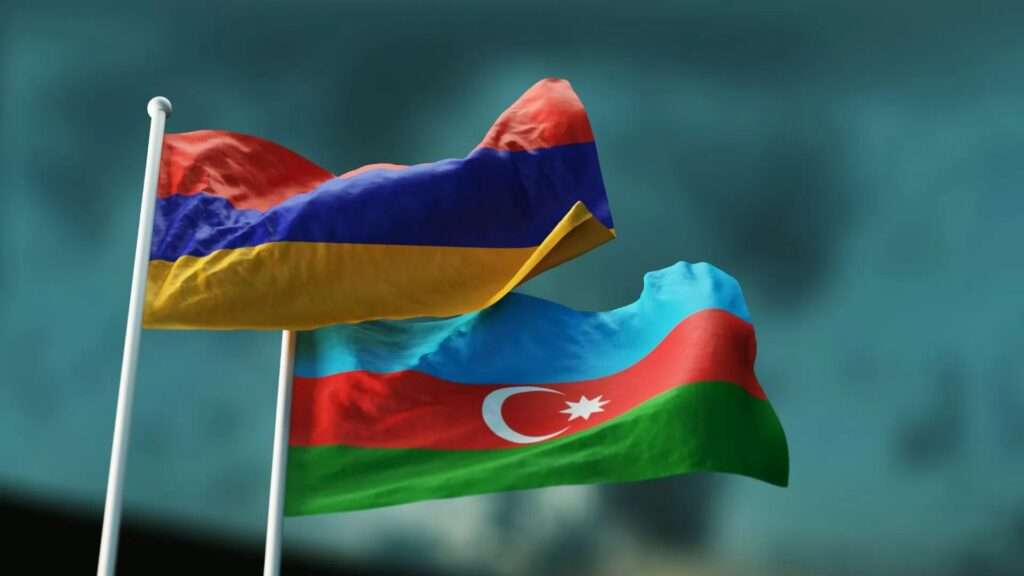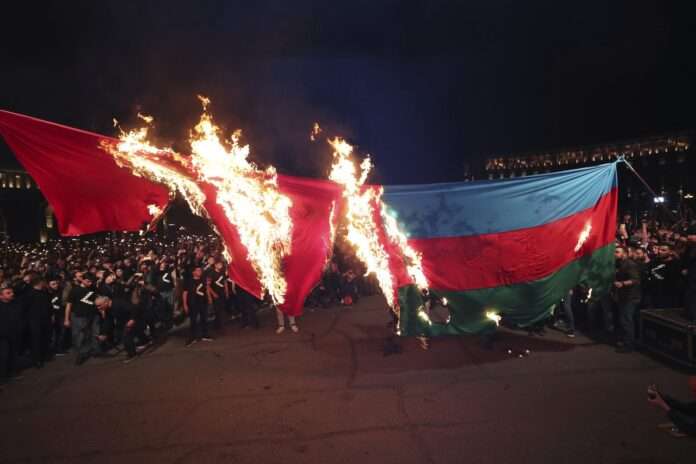The recent flag-burning events in Armenia have created a new wave of political hate in the Caucasian region, where the Azerbaijani nation is already witnessing various acts of violence from Armenia. The recent event took place on April 14, 2023, during a European Weightlifting Championship in the Armenian capital, Yerevan. During the opening ceremony of this official multinational event hosted by Armenia, a man set fire to the flag of Azerbaijan and communicated a high level of animosity against the neighbouring nation. Undoubtedly, the Armenian government formally condemned this act of violence, but this act has gone on to raise several serious questions about the security of the international sports community in Armenia.
The Azerbaijani state officials highlighted the high risks to the lives of their sportsmen in foreign lands, which is causing anger in the Azerbaijani nation and its international diaspora. Akin to the Azerbaijani flag, the same treatment with the Turkish flag has further validated that the Armenian nation is becoming more violent against its Muslim neighbours. The Turkish government authorities have considered the flag of a nation symbolizes all the fundamental values, beliefs, and freedom of a nation while condemning this violent action and the perpetrators behind it. The solidarity of Turkey with Azerbaijan against Armenian aggression moved Turkish sportsmen to dedicate their medals to the Azerbaijani nation. This was the commendable manifestation of the Turkish cooperative ties with other states, which the Azerbaijani government has formally acknowledged with high regards.
The flag burning in society is fundamentally an aggressive response of Armenia against the new realities of the Caucasian region in which the Azerbaijani and Turkish nations have shown their strong brotherhood and resolved the Karabakh issue with their strong cooperative determination and active political coordination. It is pertinent to mention here that the former Karabakh issue, a territorial clash between Armenia and Azerbaijan, was inherited in the bilateral conflict of both neighboring states.
The flag-burning incident, cemented in public celebrations, is an aggressive act of Armenia, mainly planned to resume the fight over the former Karabakh conflict, which has already been resolved in favour of Baku. The unfavourable results of the conflict are the fundamental reason for the traditional reluctance of the Armenian government to prevent the happenings of flag-burning in its society. The burning of the Azerbaijani flag has sent a clear message to the whole world that the political conflicts between states could witness such levels of aggression in which the contesting government could face the height of hatred and societal sentiments. The repetition of such events in various other interstate conflicts could undermine the greater vision of peace in the international system, parallel to jeopardizing the scope of sports diplomacy around the world. A strong official protest of the Azerbaijani government against the burning of their flag in Armenia has allowed the international community realize the threats to the scope of global peace and stability. It has become a controversial issue because the Armenian government has hostile policies for dealing with Azerbaijan and Turkey. This has raised serious concerns about the ongoing efforts of great powers to ensure peace around the world.

The flag-burning incidents contain substantial potential for inflaming tensions between Armenia and Azerbaijan, which will eventually leave extremely negative impacts on the international vision of peace. These Armenian acts of violence are an awakening call to the international community because such belligerent acts could well be followed by other nations who may be involved in enduring interstate rivalries. The leading intergovernmental frameworks of the international community, mainstream sports organizations, and leading European multinational institutions should develop a unanimous stance against Armenia at the soonest. In short, the greater responsibility lies on the active role of the international community because there is a need to take immediate action against the Armenian government’s inability to prevent the spread of revanchist tendencies and the glorification of war criminals at the state level. In other words, the international community, generally, and the advocators of peace specifically, are required to take timely actions and force the Armenian government to address the reasons for increasing violence at the societal level against neighbouring Muslim states. These disrespectful acts cannot be treated under the broader rubric of free speech acts because such incidents undermine the sovereign values of other countries, parallel to angering the governments and societies of other states.
The timely responses of the international community could prevent such events from happening anywhere in the world. The Armenian government should also address the negative consequences of such disrespectful events with strict legislative measures instead of formally passing general statements. While considering the significance of peace in the Caucasian region, the Armenian leaders should work towards finding peaceful solutions to its ongoing conflicts with other states. The maintenance of peace between both neighboring states will create a peaceful regional politics where the Armenian and Azerbaijani leaders could work together by resolving their mainstream points of disagreements through mutual consultations. For the achievement of this objective will require Armenian leaders to stop the continuation of human rights violations, parallel to respecting the territorial integrities of neighboring states.





